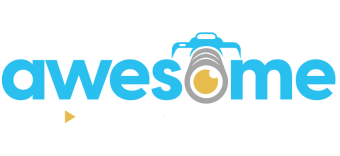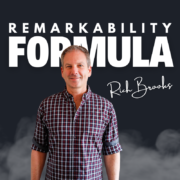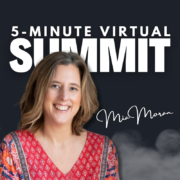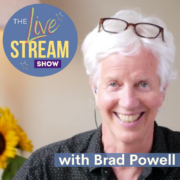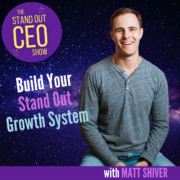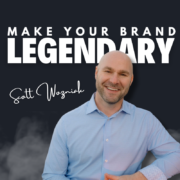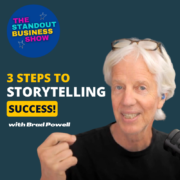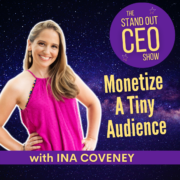160. What makes your business remarkable? with Rich Brooks
If you’re a listener of The Standout Business Show, you know we’re all about developing your personal brand and earning attention from the right crowd, because your ability to engage and build relationships with your ideal clients is absolutely essential to the health of your business.
Well, this week’s guest is agency owner Rich Brooks and he believes the key to standing out is figuring out what makes your brand remarkable – what are those unique qualities that turn heads, create buzz, and evoke emotion in your audience?
Which is why I invited him onto the show so he could share his Remarkability Formula that’s gonna show how you can discover what makes your brand remarkable.
Rich is the founder and president of flyte new media, a digital agency based in Portland, Maine. And he’s the founder of The Agents of Change, which is an annual conference and a weekly podcast on all things digital marketing.
So, if you want to really understand how you can stand out, how you can be remarkable in the eyes of your ideal clients – stay tuned!
Resources
Register for the Agents of Change conference & get a discount using the code: STANDOUT
New Free Training: The Art of the 5-Minute Video
Learn how to share everything you know in 5 minutes or less.
In just three 5-minute videos you’ll learn:
- How to set yourself up on camera to look and sound as professional as you can
- What to say & how to structure your video so people will not only watch but be inspired to take action
- The #1 thing to say in your video that will ensure people remember what you said
Transcript
Rich Brooks:
We interviewed a few different painting companies and one guy told me he’d get the whole job done in two days. And the way that he did it. He showed up with about 20 guys in five white vans. They poured out of the vans like they were clowns in the circus, threw up ladders, painted the whole house. They were done by sunset with all their equipment removed. I think they were singing sea shanties the whole time, but maybe I’m just embellishing, I’m not really sure at this point. They came back two days later, after the paint had dried, did the whole thing again and then they were gone and, as you can imagine, 20 guys painting your house with five vans out front.
Rich Brooks:
The neighbors took notice and they were asking questions about it. To your point of you know, having remarkability means people can tell that story again and again. So in my mind that was a really remarkable thing that was already going on within this company and if they were my client I would have said this is really your unique selling point. This is what makes you remarkable. It already exists and you just need to give it a name and then kind of run with it.
Brad Powell:
Welcome to the Standout Business Show, where it’s all about making a bigger difference by doing business differently. I’m Brad Powell and, as a listener, you know that we’re all about attracting attention and developing your personal brand, because your ability to engage and build relationships with your clients is absolutely essential to the health of your business. Well, my guest today is agency owner Rich Brooks, and he believes that the key to standing out is figuring out what makes your brand remarkable. What are those unique qualities that turn heads, create buzz and evoke emotion in your audience? Which is why I invited him onto the show today, so he can share his remarkability formula that’s going to show how you can discover what makes your brand remarkable.
Brad Powell:
Rich is the founder and president of Flight New Media, a digital agency based in Portland, Maine, and he’s the founder of the Agents of Change Conference. It’s an annual conference and a weekly podcast on all things digital marketing. So if you’re wanting to unlock the secret to remarkability and standing out in today’s crowded digital marketplace, stay tuned, and with that let’s start the show. All right, rich, welcome to the show.
Rich Brooks:
Thanks, Brad, that was a great introduction and, being a podcast host myself and having over 550 episodes under the belt, I always find it’s funny when somebody says, oh, what a great introduction. And I’m like, yeah, you gave me your bio, but you actually I don’t know if you ad lib, but whatever, you added so much to my bio, I was excited to listen to this episode. So thank you.
Brad Powell:
All right, well, you’re welcome. Doing my best here – ad libbing is a key ingredient.
Rich Brooks:
Absolutely.
Brad Powell:
Right. Well, to get us started, I love the term remarkability, it’s it’s just a great great term and but let’s let’s wrestle it down to the ground and see what we actually mean by that. Like what for you, what does it mean for a brand or a business, or even a person who’s developing their personal brand to? What does it mean for a brand or a business, or even a person who’s developing their personal brand? What does it mean for them to be remarkable?
Rich Brooks:
Right, and I chose the word remarkable and remarkability for very specific reasons, because it does feel like one of those huge, outrageous goals that we set for ourselves, and it is a term that is absolutely a little scary for most people ourselves, and it is a term that is absolutely a little scary for most people, the idea of being remarkable. I think some of us suffer from imposter syndrome. We’re like, oh well, we’re not remarkable, our business isn’t remarkable, Maybe we’re a little bit this way or that way, but remarkable really means that you’re going to step into this idea, that you are unique, and I’ve been running my agency for 27 years and I’ve talked to hundreds, if not thousands, of businesses and some of them just don’t seem to recognize how to stand out online and that they may already have something to stand out online or offline as well. And so part of the development of this idea, this framework of the Remarkability Formula, was not that I come up with a new idea, because you know, seth Godin’s been talking about the purple cow and then there’s the blue ocean strategy and, of course, everybody’s familiar with the unique selling or value proposition.
Rich Brooks:
My purpose in kind of developing this framework was to help any person or any brand, really understand how they could stand out, how they could be remarkable in the eyes of their ideal clients. And that’s where the framework came from, and I’m sure that we’ll have a chance to kind of talk through the four lenses that help you identify what makes your brand truly remarkable.
Brad Powell:
When I hear the word remarkable, I mean the root is talking about remarking. Remarkable, I mean the root is talking about remarking, and it’s kind of like that, you know, give people something to talk about is the way to become remarkable. It’s not just, you know, be different or be unique or be unusual. It’s that not only will that be true for you, but that other people will also take that and share it and talk. I mean, this is Seth Godin talks about this a lot in terms of the sneeze ability of you and your business and your content. So how do you like, when you see this and the relationship to your audience and your prospects, engaging them in a way that not only is like oh, that was really different, but will basically enroll them in literally becoming spreaders of the message and mission that you’re on?
Rich Brooks:
I definitely think that that’s one of the outcomes of doing something and really identifying what makes you remarkable. And it may be that you’re already doing remarkable things, but maybe you haven’t positioned yourself the right way or maybe you haven’t identified it or maybe you haven’t named it. I know that there are a lot of people that talk about how to get people to spread the word and Jay Baer has a great book about that too. All of that is really good content and giving it a name so that it’s easier for a you to explain it to somebody, to have that tagline or or that elevator pitch, and then also so that they can wrap their head around it and they’re more likely to share with other people. So I definitely think that’s one of the benefits of really kind of honing in on what makes your brand remarkable.
Brad Powell:
All right. Well, let’s dive in and explore the remarkability formula itself. I know that there are four F words that define it. Yes, put it one way Absolutely.
Rich Brooks:
Yeah. So what I ended up doing is I was kind of trying to understand how the companies that we work with could really stand out, was. I started kind of coming up with all these ideas, both from our own clients as well as famous brands that were out there, and I ended up literally just kind of organizing them with sticky notes and they ended up being kind of in four different areas, and so, very quickly, the four lenses that I talk about are find, focus, forge and frame, and I’ll kind of break those down a little bit and then I’m happy to answer questions about each one. Find is that there is already something remarkable about your business and all you really need to do is identify it and give it a name.
Rich Brooks:
Focus is the idea of niching down so that you are delivering a solution that only you can deliver to your customers, and by narrowing or niching down you’re really getting rid of any of the competition. Focus I’m sorry, forge is a little bit is the third one, and Forge is about creating something that is outside of your traditional offering but still in alignment with your mission and vision and values. That one’s probably the toughest to wrap your head around, so I’ll give some examples there too. And the last one is frame, and that’s just about how do you position your offering in a new or unique way so that the value of what you do is clearly communicated to that ideal customer. So find focus. Forge and frame are the four lenses that you can turn on yourself, turn on your own business, your brand, to really help you identify your own remarkability.
Brad Powell:
All right. Well, we’ll go back to the beginning of finding the thing that is cool and unique about yourself. So, when you’re working with clients and you’re helping them go through this initial process, what are the things that you ask them or tell them to look for when they’re looking inside or under the hood of their business and saying, well, what do we got here?
Rich Brooks:
that’s at all distinctive saying well, what do we got here? That’s at all distinctive, right? So I think what I usually tell them, or that we do for them, or if people are doing this on their own, what I would recommend is it’s not about what you think, it’s really about what your customers think. So usually I’m working with businesses that have some sort of history. They have some sort of client base that they can go back to, and what I usually recommend, and what we’ve done for people in the past, is interview some of those past clients, asking them about what state they were in when they first found this company, what problem they were looking to solve, what the outcome was and all those sort of things. And very often I mean one of two things is going to happen Either it’s going to reinforce what you already think is your unique selling proposition or you’re going to discover that people find value in your business that you never even realized was there.
Rich Brooks:
And just a very easy example when I bought my first home many, many years ago, first time homeowner, there was the paint. It needed a paint job really badly. I had never gone through this. I talked to some friends. They’re like oh, getting your house painted is really this ordeal, where they’re going to come and they’re going to turn your house into this basic work zone for like a week or more. They won’t show up on time. The job’s going to be dragged out.
Rich Brooks:
We interviewed a few different painting companies and one guy told me he’d get the whole job done in two days. And the way that he did it. He showed up with about 20 guys in five white vans. They poured out of the vans like they were clowns in the circus, threw up, threw up ladders, painted the whole house. They were done by sunset with all their equipment removed. I think they were singing sea shanties the whole time, but maybe I’m just not really sure at this point. They came back two days later after the paint had dried, did the whole whole thing again and then they were gone and, as you can imagine, 20 guys painting your house with five vans out front. The neighbors took notice and they were asking questions about it.
Rich Brooks:
To your point of you know, having remarkability means people can tell that story again and again. So in my mind that was a really remarkable thing that was already going on within this company, because it’s very hard to keep 20 people on staff, especially in Maine, where the painting season is so short. So that was something that was already in their company. They didn’t necessarily lead with this, it was something that just kind of came up in conversation and if they were my client, I would have said this is really your unique selling point.
Rich Brooks:
This is what makes you remarkable. It already exists and you just need to give it a name and then kind of run with it. So that’s an example of find. But it could be something that’s in your pricing, something in your positioning, something in your location. But there’s already reasons why people choose you and it’s about identifying and giving it a name that really makes it come through. And I’ll just say that, just because you’ve, whether or not you find something and find, you should still continue to keep going, because it’s more about layering these things on top of each other and not just saying, oh, I found something, I’m done.
Brad Powell:
Right, right. Well, did those guys make any video about the 20 guys?
Rich Brooks:
Way before, yeah, way before anybody was making any video. This was probably back in 1999 oh yeah, right right.
Brad Powell:
All that stuff, any of that stuff we did back in the 90s, is invisible. It doesn’t exist anymore for better and worse it reminds me.
Brad Powell:
There’s a woman down in in new orleans who, after katrina, she, you know, she I don’t think she’d ever done anything like this before, but she got into the demolition business and bought, you know, I don’t know, a bulldozer or something that could knock things down, but she painted her bulldozer pink and her company has grown Like it’s now huge, and one of the things that she does regularly is, anytime she buys a new piece of equipment, she’ll hold a press conference and have this pink, you know giant, whatever it is machine, you know, and she’ll actually get you know coverage because she’s, first of all, women in construction and all her bulldozers and all her people are wearing pink. It’s, and all her bulldozers and all her people are wearing pink. It’s quite remarkable, definitely. And yeah, all right.
Brad Powell:
So now we’re going to narrow in on who we’re talking to, and I think there’s like two different sides of the coin here. One is people think about niching down as well I’m going to speak only to people in this one industry lane like just lawyers or just plumbers or something like that, whereas the other lane that can be parallel, is well, what kind of problem do they have? And do I solve this in an unusual way. And so, when you’re thinking from the relative part of remarkability, it seems like, even though you might be niching down to a single industry, that by itself isn’t necessarily particularly remarkable. And so how do you, when you’re talking about stacking things up, what are the things and opportunities you see for people to stack? When it comes to narrowing, yeah.
Rich Brooks:
So I think, kind of what you’re getting at is a great point. Like generally, the two ways that people could niche down or niche down is either by going after a specific industry or a specific demographic, and that’s a smart move to make, a good business move to make. And the other thing would be is not necessarily to go for a specific industry, but instead to go for a specific service. Like I only do Facebook ads, you know, and then if you combine those I only do Facebook ads for lawyers Then all of a sudden you become this amazing resource. Yes, you can’t do business with most of the world, but lawyers who are interested in Facebook ads will definitely seek you out. And so that’s kind of the idea of of niching down, where we really just focus on something, on a very specific area. And I know when companies start out, we’re all like this, we want to be all things to all people, but that’s absolutely the worst business advice that you can follow. And so I think what you really want to think about is how can I serve less people, how can I reduce my hours, how can I restrict people from working with me, which sounds counterintuitive, but what you’ll find is you’ll attract that small niche as long as it’s big enough to keep you in business, and you will immediately become the most sought after person for that.
Rich Brooks:
And I mean just this is kind of a strange example, but when I moved into my most recent home my current home I was looking for an oil company and when I went online and found the cheapest oil delivery prices, I noticed that this one company that had the lowest prices basically stopped their delivery about a block in front of my house. But you know, I figured what’s the big deal? I’m sure they would go an extra block to get another customer. I called them up and they said I’m sorry, you’re outside of our range. And instead of being upset about it, I was actually really impressed because they probably sat there, done the math, they know that they have enough potential customers in that geographic area and once they start going outside of it their costs are going to go up. It’s going to take longer to make those oil deliveries, it’s going to cost more gas to deliver that oil. So they can keep their costs down by only serving this very small area, even though it means they’re not going to be serving all these other people and the other benefits to really niching down is how fast you become an expert in that field.
Rich Brooks:
And when I was doing the research into this, I found out that I think it was back in 2017 was last data they had for this, but the average American primary care physician makes a very healthy $299,000 a year, or $249,000 a year, sorry, but the average specialist in America in that same year made $399,000. So $150,000 more a year for actually being able to help fewer people with fewer problems. But they became so good in this. And what I think is true about humans is when something’s really important to us whether it’s our health or our finances or what have you that we’re more willing to pay a premium to get that specialist.
Rich Brooks:
We don’t want a general physician. If we need a hip or a knee replacement, we want the person, the doctor, the surgeon who’s always doing hip or knee replacements because he or she has done so many. They’re obviously the best. So, really focusing down and trying to serve a smaller and smaller audience as long as there’s enough people in that audience that you can be profitable, then I think that’s an absolute way to go. And again, being remarkable is about continuing to layer these things on so you continue to become the only go-to resource for your ideal customer.
Brad Powell:
Yeah, I think that you know the thing of solving a particular kind of issue for people when you’re talking about this is something that you can rinse and repeat again and again as your niche. I mean the story of Alex Hermosi’s first gym business, where he’s going to gym owners and saying, look, I’ll fill your gym and if he can do it really well in one place, he can kind of take that exact same process and do it again and again, which is, of course, what he did, and it’s how his first business did so well for him Put him on the bathroom now.
Brad Powell:
So let’s talk about the forging process I love the word forge, by the way and what you’re talking about doing things that are like outside the normal range of where you might be or might be thinking of doing stuff. So how do you help people get to that particular place, because I bet there’s a lot of resistance there.
Rich Brooks:
There can be. Sometimes it already exists, but sometimes it is about forging something brand new and it is not something that’s necessarily going to generate you direct revenue. So that can be tricky. But for example, there’s a restaurant up here in Maine called the Lost Kitchen and they only take reservations by postcard. And you might think like, oh my God, like what a hassle that is. And they get like 20,000 postcards a year. They have to come in during a very specific time and last time I checked it was 20,000. The number may have already gone up and this is a very sought after restaurant. But the idea that they would only accept postcards you can’t call, you can’t go there, you literally just have to fill out this card. It’s almost like getting grateful dead tickets.
Rich Brooks:
Back in the seventies and eighties you had a mailman and hope it came back to you and this is how it works. And so there’s almost a lottery system there and like part of you might say, well, there must be an easier way to do this. I mean, think of all the paper cuts that you must get trying to go through 20,000 postcards. But when you know and understand more about the brand of the lost kitchen, that it’s very organic, that the owner is self-taught, that very often all the food that came from the local farms, those same farmers, are actually going to be your servers at night, that they sit you at these very long family style tables next to strangers and you know you don’t the menu is already predetermined based on what came in that day. It’s a very organic experience. So the idea of having to send in a handwritten note saying that you want a table that just kind of very much feels in line with everything else and to your point that you made at the beginning of the conversation, brad gets people talking. It got journalists talking, got foodies talking. Everybody loves this whole idea, even though it’s an extra step, a little bit of extra work.
Rich Brooks:
And along the same lines, keeping the food motif going here is I don’t know if you’ve ever overcooked spaghetti. God knows I have. It seems easy enough, right. It says right on the side of the box cook for nine minutes, 11 minutes, what have you. But we almost always seem to, or very often we’ll overcook it. And the company? Oh, my goodness, I’m blanking on the name of the company right now, but there is an Italian pasta company. Begins with a, b. Can’t believe I’m blanking on it. I guess remarkable enough, but they have Spotify playlists that are timed to the exact length.
Brad Powell:
That’s brilliant.
Rich Brooks:
Of each one of their pasta styles. So it’s like boom bat, fusilli or mixtape spaghetti. All and all of these are featuring Italian artists and the artwork on the front on the on the playlist are by Italian. You know creators as well, and it’s just a fascinating, interesting way of kind of showing that it’s in alignment with their brand. It didn’t. You don’t have to use it. You can use, you know, that smart speaker in your kitchen and ask it to time things for you. But it kind of just reinforces this whole thing that they believe that cooking is art. And it may be to your point that you already have something that you forged and you just didn’t even realize it. And that’s what happened to me.
Rich Brooks:
We’ve been putting on an agents of, putting on a digital marketing conference called the agents of change. Nobody has to attend the conference to work with my digital agency, flight New Media, nor do you have to be working with Flight to attend AOC. They’re completely separate things, but there’s a lot of overlap in terms of the content that we discuss and the goals for both of them. One is a done-for-you agency and the other is a let’s show you how to be the best digital marketer you can be. But when I get up on stage to speak and to announce the beginning of the conference, people see me on stage and they see me as both agents of change and Flight New Media and that’s had a huge impact on our business.
Rich Brooks:
As people then see that, or people have brought us into flight new media into their businesses and I’ll say like hey, how did you hear of us? And they’ll tell me, oh, I’ve been going to agents have changed for years and I’m finally ready for a new website. Or I’m finally ready for SEO. So a lot of times, creating these things outside of your business can really help people identify who you are, what you stand for, and will get you more business than you would have gotten without them. And that’s the whole idea behind Forge.
Brad Powell:
Yeah, well, you’re absolutely putting yourself in the middle of a conversation of your audience that wants to happen, and you’re the host, you’re the moderator, you’re the one that they’re all seeing right in the middle of all of that, which is terrific. It’s a great, great way to have your work, your actual work, be positioned within this larger bunch of stuff that’s going on all around it. And I’m going to go back to the playlist idea, though. That’s just so brilliant. I mean the idea. First of all, people are cooking from home, they’re making pasta and they’re inviting their friends over, and then they put on this playlist and people go what is that? And so people are, whatever, moving and dancing in the kitchen to this music, and that’s definitely something for people to take with them and say oh right, we got to do this, we got to try this next week for ourselves.
Rich Brooks:
And it’s Barilla Pasta. I want to give credit where credit is due. The name came back to me, so Barilla Pasta. You can check it out on Spotify, and these lists have like 18,000 likes on them, so people are actually listening to them and enjoying them too.
Brad Powell:
Yeah, I can imagine that’s really really good, all right. Well, let’s do the last one. Looking at my notes, here we’re talking about the frame which is another great one and it’s basically you know, position yourself somewhere in that frame.
Rich Brooks:
Right, and my favorite example of this is a woman by the name of Wendy Huang. I heard about her when I was reading a book called the Introvert’s Edge, and it was about a business coach who basically would come and help a company you know, company reposition themselves or position themselves in new ways, among other things. And for Wendy, she was teaching people Mandarin out in California and business was great, very successful. But then after a while she noticed that a lot of low-priced competitors were kind of charging less and eating up a lot of her market share. And, worse than that, people were even taking lessons on sites like Fiverr. And all of a sudden she found that she was competing on price and that she was losing a lot of her business, losing her profitability. She was worried that her business was going to disappear, and so the coach came in and they were talking about what they were doing and he identified two people who were taking her Mandarin lessons because they had been transferred to China for business. And not only was she teaching them Mandarin, but she was also teaching them how to behave and what the expectations were once they got to China when it came to business interactions. And on top of that she was working with the spouses and children to kind of help them get ready for this big move, because it is a big culture shock when you, when you move from the west coast to to china. And he said, oh, so you’re not just teaching them chinese, teaching the mandarin, you’re actually helping them succeed in china.
Rich Brooks:
And from that moment on they rebranded her as the china success coach. And not only did they rebrand her, and suddenly she’s no longer competing on price. She wasn’t adding anything. These were all things she was doing. But now they’ve got kind of a package around her so that people better understand what she can actually deliver. And on top of that she started focusing on businesses that were transferring people to China for business, so that she was getting a steady line of referrals. So again, she’s kind of taking that frame and she’s also combining it with focus, which again is that whole point of don’t just stop with one thing that’s unique about your business. Go through the whole process, identify everything, put it all together, and that’s where that true remarkability really comes out.
Brad Powell:
The success in China coach. That’s a good one. Yeah, I can imagine people doing that for just about any location on the planet. Absolutely and a good one. So anyone listening out there if you’re teaching a foreign language and you want to up your game, great idea for you. I’m sure that people aren’t doing it for Lithuanians yet there you go, that’s your niche.
Brad Powell:
Right, all right. Well, this is way cool. We’re just about at the end of our time today, so if there’s just one more thing that you’d like to add to the realm of remarkability, what would that be?
Rich Brooks:
I would just say, you know, kind of reinforce the idea that remarkability is like beauty and it’s in the eye of the beholder.
Rich Brooks:
So just because you think something is truly remarkable about your company, if your customers don’t agree with it, then it’s not remarkable, it’s just some feature of your business.
Rich Brooks:
So I really think that it’s key that, if you have any sort of history with your business and with clients, is that you go talk to your current client base, you go talk to your past clients and you interview them and really get a better understanding of what the problem was that they felt they had and how your solution solved it, because that’s where really some of the most interesting insights take place.
Rich Brooks:
And when I first started doing this, I didn’t have the AI tools that are available to us today, but one of the nice things about using Zoom and using an AI note taker I prefer Fathom is that you can take a bunch of these interviews and, with permission, record them, drop them into something like Fathom and then put them into something like ChatGPT or Cloud and start to ask questions of all those interviews, ask questions about the data, and you’ll be able to pull great insights, and the more people you can interview, the more insights you can gather from that. So this is something that can really be sped up and enhanced by using some of the AI tools that are now available to us that weren’t necessarily available when I started this remarkable journey.
Brad Powell:
This is way cool. I love the idea that the success of your business is in the eye of the beholder. That’s a good one to keep in mind that perspective. So we want to talk about, first of all, the Agents of Change conference, which is coming up in the not too distant future, and I know that you’ve got a special offer for folks who might want to attend the conference. So what is that?
Rich Brooks:
Yeah, so we’re having our 10th annual Agents of Change digital marketing conference this takes place in Portland Maine, but it also takes place online, so I know that not everybody’s going to be able to get to Portland Maine. The conference is on October 9th, 2024. We’ve got a deep dive workshops which are at add on on the next day, the 10th of October. But for people who are interested, we’ve got 15 amazing digital marketing experts coming to Portland Maine getting on stage sharing their best secrets for an all-day event. And you can find out more at theagentsofchangecom and you’ll find the information about the conference and you’ll be able to see who all the speakers are. You’ll be able to see the agenda, all the details on that.
Rich Brooks:
Through the month of September, we’re running a back-to-school special, so you can save $50. Through the month of September, we’re running a back-to-school special, so you can save $50. But even if you miss that, you can use a promo code STANDOUT, just like the name of the show, and you’ll save an additional $25, either off the already discounted price or off the full price. And that’s good for those digital passes too. Stream and you want to see all the sessions on demand. Head on over to theagentsofchangecom and think of Brad and use the promo code STANDOUT and you’ll save 25 bucks off your ticket.
Brad Powell:
All right. Well, I’ll make sure that links to all of that and the standout code are in the show notes. I’m going to go there. I’ll be there in Portland. Excellent, I’m in Boston, so it’s only an hour and a half drive.
Rich Brooks:
So yeah, oh, my totally day trip.
Brad Powell:
I might even just take the train, which is a even more fun to get there. Absolutely Really fun to have you on today, Rich. I will look forward to seeing you again in October.
Rich Brooks:
I appreciate it, Brad, and I appreciate you sharing the stage with me and inviting me on, so thank you very much.
Brad Powell:
And for those of you listening at the end, I just want to remind you that if you’d like to go and get the entire archive of the Standout Business Show, just go to standoutbusinessshow and it’s all there all the audio, all the video, all the show notes, all the special offers, and you can binge to your heart’s content. We go live every week at 11 am Eastern Time on Tuesday and on Thursday, and until the next time, so long.
